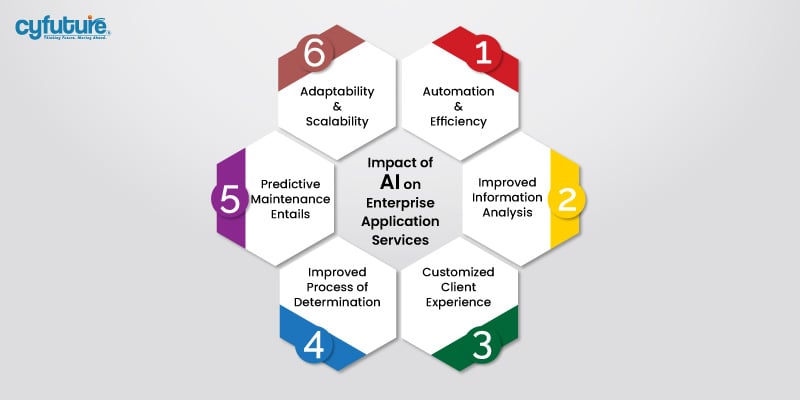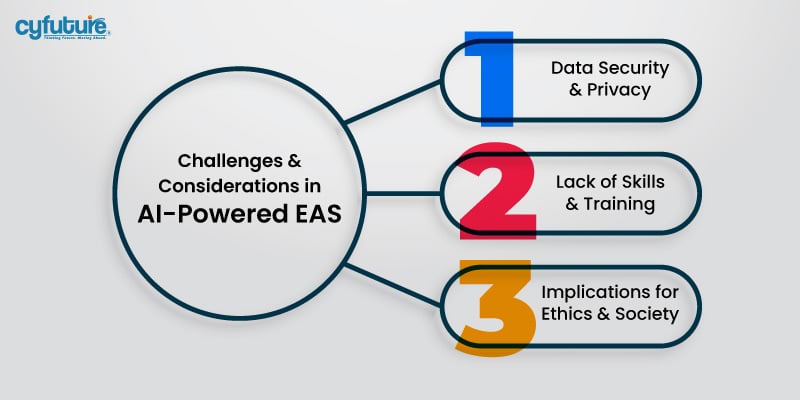-
Get Cloud GPU Server - Register Now!
Toggle navigation

In today’s quickly changing technological landscape, business enterprise application services are one of the areas that stand to gain considerably from the incorporation of artificial intelligence (AI). As businesses want to boost productivity, efficiency, and competitive advantage, artificial intelligence (AI) is being used to disrupt traditional business processes and rethink enterprise application services quickly.
Moreover, AI is rapidly becoming an essential component of the technology ecosystem as its developments are transforming the way organizations operate, compete, and prosper. The primary reason for this shift is artificial intelligence (AI), which can learn, adapt, and optimize processes beyond what humans can.
Additionally, it was projected that the global artificial intelligence market will be valued at $136.55 billion in 2022. Robots and learnable algorithms are examples of smart gadgets, and the market for them is expected to grow quickly! Between now and 2030, researchers predict that it will almost triple in size, from $197 billion to $1,812 billion. That’s like implementing smart machine technology worth another US economy’s value in just 7 years!
However, let’s take a look into a few stats and data before delving deep.
Now, by delving deep into the advantages, difficulties, and potential effects down the road, this blog examines the significant influence of artificial intelligence on business enterprise application services.
It is crucial to establish business enterprise application services before delving into the role of artificial intelligence. A variety of software solutions targeted at enhancing and simplifying business procedures are included in these offerings.
These comprise, among other things, supply chain management (SCM), customer relationship management (CRM), enterprise resource planning (ERP), and human capital management (HCM) systems. These applications essentially act as the cornerstone of contemporary enterprises, facilitating efficient data management, communication, and decision-making.

To carry out duties and reach decisions, enterprise application services have always employed structured data and established rules. These systems were helpful in some situations, but they usually had trouble adjusting to new environments and demands from the company. Consequently, presenting AI-powered enterprise application services, which analyze vast amounts of data, recognize patterns, and provide insightful real-time forecasts and recommendations by applying sophisticated algorithms and machine learning techniques.
Artificial Intelligence, formerly thought to be a concept for the future, has rapidly developed into useful commercial applications. Predictive analytics and natural language processing are just two examples of AI technologies that are transforming how companies function and compete in the digital world.
By automating laborious tasks, enhancing data analytics, and facilitating wise decision-making, artificial intelligence (AI) is revolutionizing traditional business application services processes.

Among the most important benefits of integrating AI into corporate application services is automation. Artificial intelligence (AI) may be able to automate repetitive tasks like inventory management, report generation, and data entry, freeing up critical human resources to focus on more significant initiatives. This reduces errors and expedites decision-making procedures, in addition to improving operational efficiency.
Large data sets can be examined by AI systems much more quickly than by humans. Through the use of machine learning and data mining techniques, enterprise applications may extract valuable insights from complex datasets, enabling businesses to make better-informed decisions based on precise and accurate data. Businesses may stay ahead of the competition by using AI-driven data to improve supply chain operations, forecast customer behavior, or predict market trends.
In a time when the consumer is king, artificial intelligence (AI) is essential to delivering personalized experiences at many touchpoints. Companies may tailor goods, services, and marketing campaigns to each customer’s needs by analyzing customer interactions, preferences, and comments using CRM systems with AI capabilities. Artificial intelligence (AI)-)-enabled apps, such as virtual assistants and recommendation engines, aid companies in forging closer bonds with their customers, which boosts customer satisfaction and loyalty.
AI speeds up and improves the accuracy of data-driven decision-making on EAS systems. AI systems have the potential to provide valuable insights that help businesses make informed strategic decisions by analyzing historical data and identifying trends.
Based on sensor data and historical performance in industries like manufacturing and logistics, AI-powered EAS can forecast equipment failures and maintenance needs. This preventive approach reduces expenses, minimizes downtime, and optimizes asset use.
Due to the inherent scalability and adaptability of AI algorithms, EAS solutions can handle growing data volumes and shifting business needs without the need for administrative intervention. Scalability ensures that businesses may expand their operations without difficulty and without facing technological limitations.
Although the use of AI in business enterprise application services has many advantages, there are challenges and problems associated with its deployment. They are as follows:

Data security and privacy must be protected, as artificial intelligence (AI) depends heavily on data for training and decision-making. Organizations must adhere to strict data protection regulations and implement advanced cybersecurity measures to protect sensitive data from breaches and unauthorized access.
A skilled workforce that can develop, implement, and oversee AI-powered solutions is necessary to fully fulfill the potential of AI. Nevertheless, there is a sizable skills gap in the AI talent pool, which creates challenges for businesses wishing to integrate AI into their workplace applications. To close this gap and foster an AI-literate culture inside the company, training, and development of staff members is essential.
Concerns with the ethical use of AI are becoming more apparent as technology is used in more commercial activities. Businesses need to handle the ethical and social implications of AI deployment, which might include algorithmic bias and job displacement, to facilitate responsible and inclusive AI use.
The use of AI in corporate enterprise application services has both a promising and challenging future. More innovation and integration across a range of domains, from AI-powered ERP systems to self-sufficient supply chain management platforms, should be anticipated as AI technologies advance. Nevertheless, an organization’s ability to capitalize on AI will rely on its ability to adjust to change, foster an inventive culture, and handle the ethical, legal, and societal issues that arise with the use of AI.
In conclusion, corporate enterprise application services are being significantly impacted by the emergence of AI, which offers a multitude of advantages including efficiency and automation, tailored client experiences, and predictive analytics. In the dynamic market landscape of today, businesses may gain a competitive edge by implementing AI-powered solutions. Problems with data security, a lack of skill, and moral conundrums are some of the challenges that this innovative route must overcome.
As we move forward, it appears that AI will play a significant role in business application services. Additional innovation and industry integration are anticipated. Companies need to nurture talent, give security and data protection priority, and discuss the moral implications of implementing AI if they want to see the full potential of the technology.
Enterprises must be vigilant, flexible, and progressive as they embark on this journey of transformation. If businesses use AI intelligently and strategically, they may open up new possibilities for growth, productivity, and innovation in business application services.
While you start your AI journey and transform your business application services, discover how AI-powered solutions may lead to increased productivity, efficiency, and growth for your company!
Will AI transform your business app services? Are you ready for this? Get in touch with us right now to find out how our AI-powered solutions can increase the growth, productivity, and efficiency of your organization.
Of course! Massive datasets may be processed at lightning speed by AI-powered analytics, which can then extract insightful information to support data-driven decision-making. AI-powered analytics enable businesses to stay ahead of the curve in a variety of areas, including supply chain operations, customer behavior, and market trend prediction.
While there are many advantages to AI, there are also disadvantages, including concerns about data security and privacy, labor skill shortages, and moral dilemmas related to AI use. In order to ensure that AI is incorporated into corporate applications responsibly and efficiently, organizations need to handle these obstacles.
The adoption of artificial intelligence is becoming increasingly accessible to businesses of all kinds. Small and medium-sized businesses (SMEs) may still profit from scalable and affordable solutions, even if larger corporations may have more resources to deploy AI. The aim is to identify suitable artificial intelligence solutions that align with the financial and strategic objectives of the firm.
Artificial intelligence is expected to play a major role in the development of business application services. More innovation and integration in many other fields, such as AI-driven ERP systems and self-governing supply chain management platforms, is something we should anticipate. The ability of an organization to deal with ethical, legal, and social issues as well as foster innovation will, nevertheless, be what defines its success.
Organizations may start by analyzing their current procedures and identifying areas where artificial intelligence might be useful. In addition to protecting data security and privacy, they should make investments in the development of AI talent and stay abreast of the most recent developments in the field. In order to maximize the benefits of AI and hasten its adoption, industry best practices and cooperation with AI solution providers are recommended.